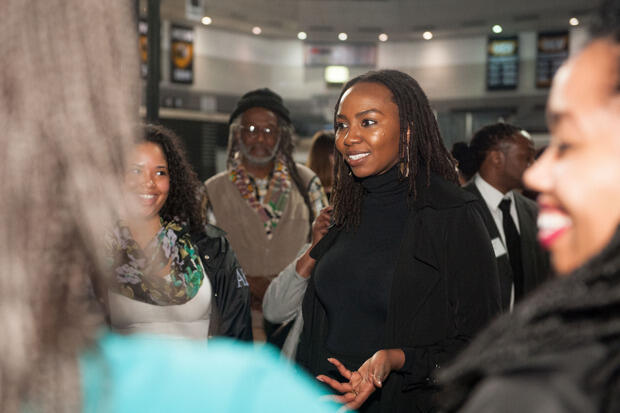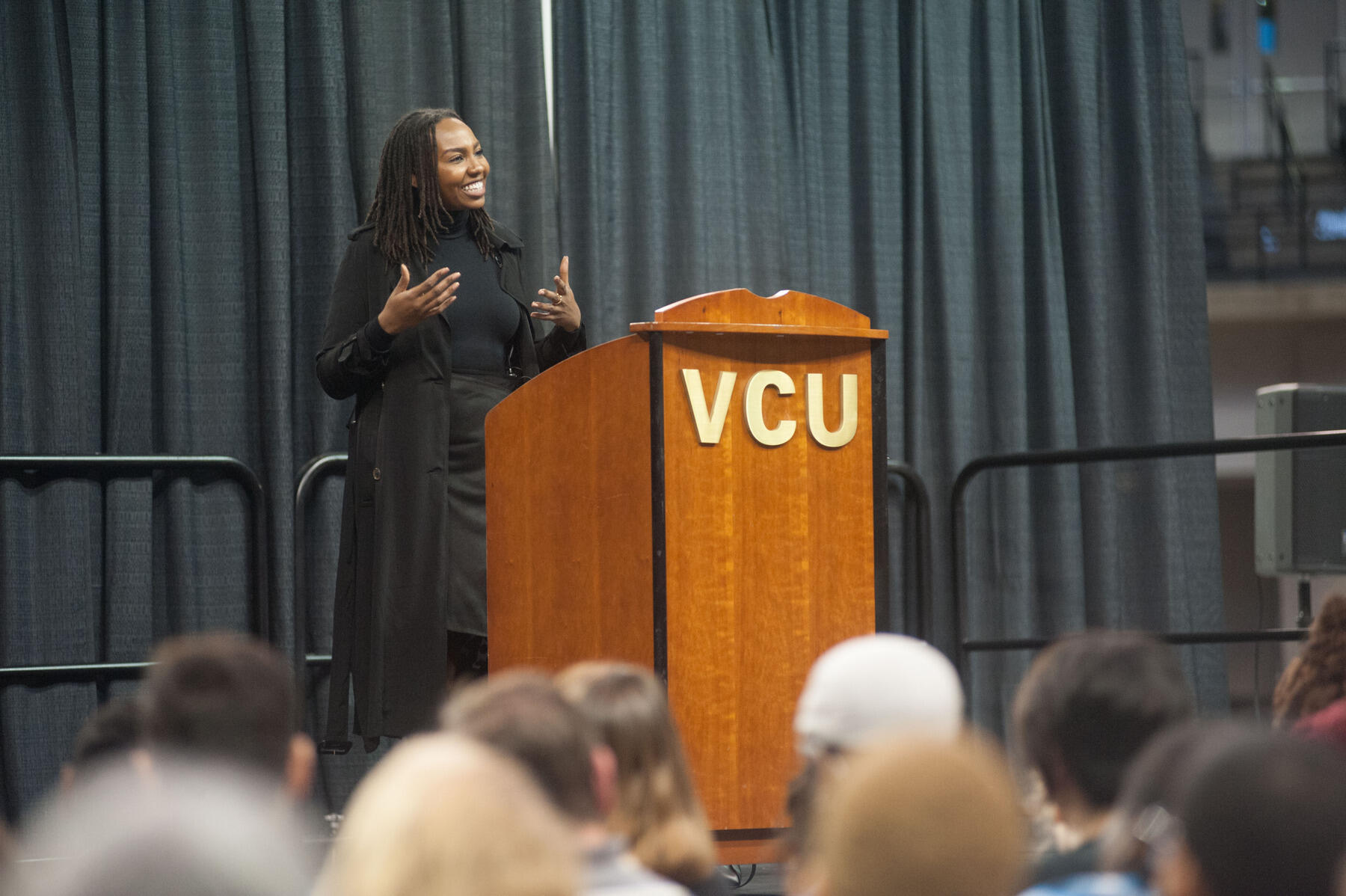
<br>Photos by Steven Casanova, University Marketing.
April 4, 2016
Black Lives Matter movement created out of love, co-founder says at VCU
Share this story
Opal Tometi, a co-founder of Black Lives Matter, said the movement was launched after the acquittal of George Zimmerman for the killing of 17-year-old Trayvon Martin out of a sense of injustice, but also out of love.
“We’re a movement that is ultimately fueled by love. I quite literally came to this intervention of Black Lives Matter because of the love I have for my brother,” Tometi said Thursday at Virginia Commonwealth University. “When I’m struck with the fact, 14 years [after he was born], he’s beginning to walk around this society with the knowledge that at any point his life could be taken? I just couldn’t stand for it. I quite literally couldn’t stand for it.”
We’re a movement that is ultimately fueled by love.
Tometi, an activist who has worked at the intersection of racial justice and immigrant rights for more than a decade, spoke at the event, “#BlackLivesMatter: Hashtag in Action,” before a crowd of an estimated 1,100 at VCU’s Stuart C. Siegel Center. Her visit was sponsored by the VCU School of Social Work and coordinated by the School of Social Work Black Lives Matter Student-Faculty Collective.
Following Zimmerman’s acquittal in 2013, activist and writer Alicia Garza wrote a Facebook post saying "Black people. I love you. I love us. Our lives matter, Black Lives Matter." Another activist, Patrisse Cullors added a hashtag, sharing it as #BlackLivesMatter. And then Tometi reached out to them, and began to coordinate a communications campaign, which spread the idea across the country, prompting activism nationwide and introducing a slogan that has rallied a new generation’s civil rights movement.
“Black Lives Matter is a phrase and an ideology in a world where black people systematically do not matter,” Tometi said. “We are absolutely shifting what is, what could be. And so Black Lives Matter is about a consciousness of a people – black folks first and foremost, because ‘black lives matter’ was about an affirmation of our own dignity, of our own lives. And then beyond that, it was a demand to the greater public, to the mainstream, to those who are in power who are maintaining the status quo.”
The status quo, Tometi said, is a society in which black lives are systematically undermined, one in which 2.3 million black people are incarcerated, despite being roughly 14 percent of the population; in which black people have high rates of unemployment; and in which the black community suffers from health disparities. And one in which encounters with police too often turn deadly, usually without repercussions.
“What is so evident is that some lives are more valuable than others,” she said. “Some people get to survive altercations with law enforcement. Some people don’t.”
Tometi pointed to several studies showing unconscious bias against blacks by whites and law enforcement. She cited research that shows white people in law enforcement view black youth as much older than white youth, that police officers and white people see black people as having less pain than whites, and that white people view darker-skinned black and Latino as less intelligent and less trustworthy than their lighter-skinned peers.
“We know the ways in which black bodies are being surveyed. And this is in fact what leads to the many statistics and the horrible stories that we hear in the news day in and day out. For myself and many people like yourselves – of conscience, who give a damn – we’re trying to bring about another world, another world where in fact all lives will in fact matter,” she said.
Opponents frequently respond to Black Lives Matter with the phrase “all lives matter.” Tometi, however, said the only reason Black Lives Matter exists is out of their fundamental belief that all lives matter.
“Contrary to popular belief, folks think that we don’t believe that all lives matter. You all hear that. You hear the response to ‘black lives matter!’ – ‘all lives matter!’ Yeah, duh! Why do you think we put this into motion? We actually believe that all lives matter. Do you?” she said. “We actually believe all lives matter. We believe that so much we were willing to call out the fact that our society is reinforcing the fact and reinforcing the systems and beliefs that would make it such that black lives don’t matter. We call that out.”
Black Lives Matter, Tometi said, simply can’t afford to be silent about the injustices it sees.
“There’s a quote that I like by Martin Luther King … ‘Our lives begin to end the day we become silent about things that matter,’” she said. “We just happen to believe that black lives matter. So we can’t be silent.”
The movement is part of the same tradition of the earlier civil rights struggles, she said, only now Black Lives Matter is making connections and organizing with online tools, such as social media.

Photo by Steven Casanova, University Marketing.
“[We are] part of the same trajectory and history of freedom’s struggle, nothing has actually really changed our commitment to liberation, our commitment to racial, social and economic justice. Those are essentially our demands. They haven’t really changed,” she said.
Toward the end of her remarks, Tometi addressed those who do not consider themselves part of the Black Lives Matter movement, telling them: “You are on the side of injustice.”
“In times like this, you don’t get to sit on the sidelines. You just don’t. There is no neutral right now. Neutrality is just affirming the status quo. And the status quo is black lives don’t matter. So what we need is for everybody to make a very conscious and deliberate decision to be either with us, or not – against us, and for the status quo,” she said.
In times like this, you don’t get to sit on the sidelines.
Racial justice, she said, is not inevitable. It will take hard work by everyone who cares about making society more just for everyone.
“You don’t get there by sitting on the sidelines. You don’t get there by tweeting only. You don’t. It’s going to take real people in the streets, in different strategy sessions, in organizations, that allow you to practice your beliefs,” Tometi said. “I could literally come in here and ask y’all, how many of you believe that black lives matter. I’m sure most of all of you would raise your hands.”
“But what does it look like for us to actually act as though black lives matter?” she asked. “And I would argue that all of us, every single day, should wake up and [ask] that question of ourselves – what am I going to do to ensure that black lives matter? And then do that.”
Simply supporting Black Lives Matter, she said, is not enough.
“It’s one thing for you to have nice thoughts. But nice thoughts aren’t going to save black lives. Your thinking is not moving or transforming our world. Your action will. You embodying the fact that black lives matter and bringing that world into fruition, it’s what’s going to change the world,” she said. “This movement is a movement whose time has come. But we have a lot of work to do, and we need all hands on deck … We have the power to do something about structural racism in our time, in our lifetime. We have to fight like hell to make that happen, but I actually think that we can.”
Subscribe for free to the weekly VCU News email newsletter at http://newsletter.news.vcu.edu/ and receive a selection of stories, videos, photos, news clips and event listings in your inbox every Thursday.
Subscribe to VCU News
Subscribe to VCU News at newsletter.vcu.edu and receive a selection of stories, videos, photos, news clips and event listings in your inbox.









